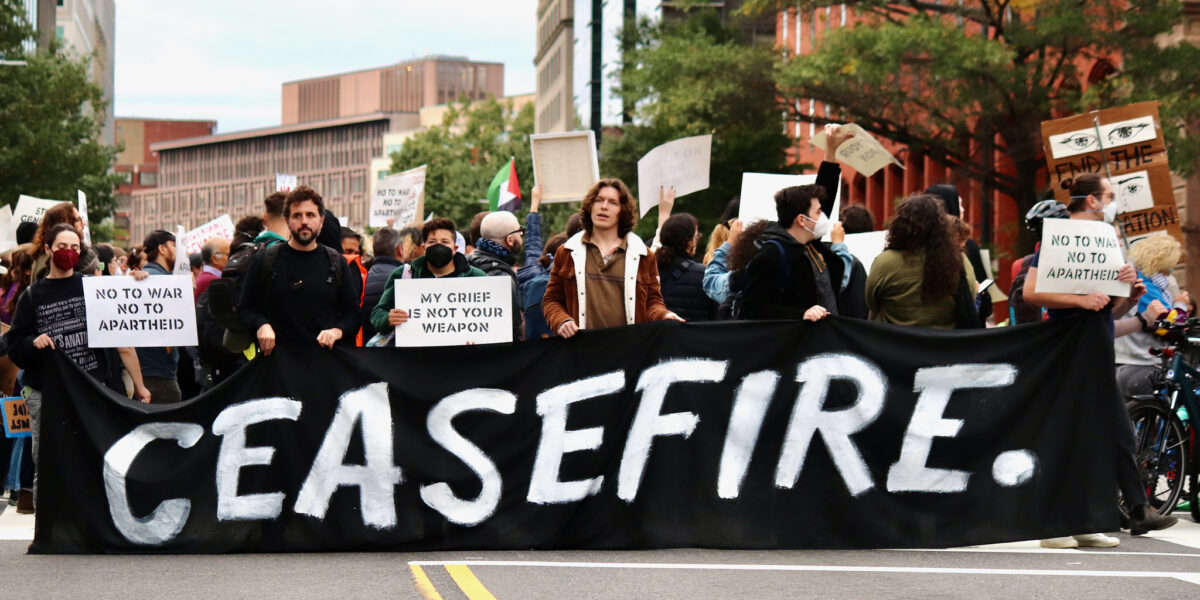On Tuesday, U.S. President Biden addressed the press while boarding the presidential helicopter, saying, “I don’t think we need a wider war in the Middle East. That’s not what I’m looking for.” But a wider war is exactly what Biden is inflaming, with unreserved support for Israel’s ongoing annihilation of Gaza and the 2.3 million Palestinians trapped there.
Demands for an immediate ceasefire are growing, and, despite promises of indefinite war from Israeli Prime Minister Benjamin Netanyahu, the United States, as Israel’s principal weapons provider, could shut down the bombardment with one phone call. Absent that, the widening war that Biden hopes to avoid seems ever more possible.
Potential escalation was recently triggered by the killing of three U.S. Army Reservists stationed at a base called “Tower 22” in the Jordanian desert, near the Syrian and Iraqi borders. It houses approximately 350 U.S. Army and Air Force personnel. Together with another U.S. military garrison called al-Tanf, about 20 kilometres to the north, in Syria, these remote outposts are part of the U.S. military presence to counter the Islamic State.
Early on Sunday, January 28, a drone was able to penetrate the base’s defences, attacking the soldiers in their sleeping quarters. The three soldiers killed were Sgt. William Rivers, 46; Specialist Kennedy Sanders 24; and Specialist Breonna Moffett, 23. All three were from Georgia and were African American. An estimated 40 others were injured in the blast.
Calls in the United States for swift reprisals grow, including demands that President Biden attack Iran. Pundits are quick to point out that we are in an election year, and thus President Biden can’t let himself be perceived as a weak military leader.
“Target Tehran,” Republican Texas Senator John Cornyn said on social media, joined by fellow Republican Senator Lindsey Graham of South Carolina, stating “the only thing the Iranian regime understands is force,” and demanding the President “hit them now and hit them hard.”
But not everyone is demanding vengeance – perhaps most powerfully, and poignantly, the parents of one of the fallen soldiers. “Moffett’s parents said they hope there’s no escalation in violence that kills more American troops,” the Associated Press reported. Francine Moffett, the mother of Breonna Moffett, told the Associated Press on Monday, “I just hope and pray no other family has to go through this…It takes your heart and your soul.”
In addition to the intense assault on Gaza that followed Hamas’ October 7 attack on Israel, military strikes have occurred across the wider Middle East. Israel and Hezbollah have exchanged artillery fire along the Lebanon-Israel border, claiming lives on both sides.
Houthi rebels in Yemen have hit cargo vessels headed to or otherwise connected to Israel, the U.S. or the U.K., in the Gulf of Aden, and hijacked at least one vessel, disrupting international shipping through the vital Suez Canal. In response, the U.S. has launched multiple missile and artillery strikes on Yemen.
Iran has hit targets in Iraq, Pakistan and Syria. Adding to the volatility, Turkey has been stepping up its attacks on U.S.-allied Kurdish forces in Syria and Iraq.
“There were about 60 attacks by these Iraqi militias against U.S. troops and bases during the first two-and-a-half years of Biden’s presidency,” Trita Parsi, executive vice president of the Quincy Institute for Responsible Statecraft said on the Democracy Now! news hour.
The Iranian-American expert on Iran continued: “Since October 7…there’ve been more than 160 attacks just in these last 100 days. At some point, one of those attacks was going to kill Americans. And the president has essentially accepted this risk…instead of raising questions about this entire strategy as to why we are putting U.S. troops at risk in order for Israel to continue to indiscriminately bomb and kill and slaughter people in Gaza.”
Spencer Ackerman, foreign policy columnist for The Nation, shares Parsi’s concerns. “The United States, while it might say that it’s seeking to contain the conflict, is caught up in the logic of escalation,” Ackerman said on Democracy Now!
“These are the accumulations of choices that Biden and his team are making to involve the U.S. more deeply in this spiralling conflict, all of which could be stopped if the United States used its immense influence over Israel.”
Polls show a majority of Americans support a ceasefire in Gaza. Scores of cities have passed ceasefire resolutions, most recently Chicago.
The Biden administration, though, appears resolute in backing Israel’s military assault on Gaza, with its continued supply of weapons, despite the International Court of Justice’s recent provisional finding that Israel may be committing genocide.
Ceasefire and diplomacy, not arms and diplomatic cover, leading to an end to Israel’s occupation of Palestine, is the only solution.
This column originally appeared in Democracy Now!



